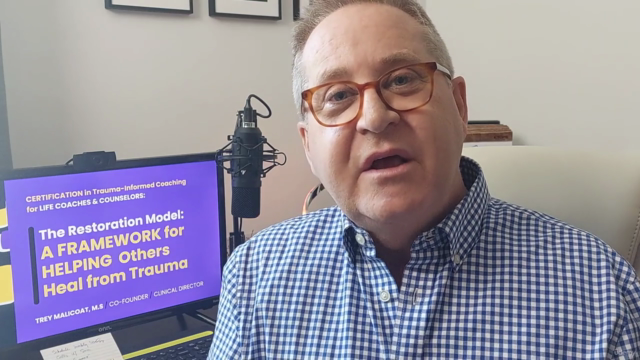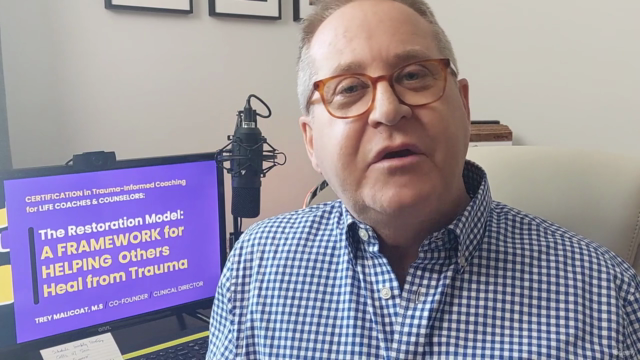CERTIFICATION in Trauma-Informed Coaching & Counseling

Why take this course?
🚀 Course Title: CERTIFICATION in Trauma-Informed Coaching & Counseling
👩🏫 Instructor: Trey Malicoat, M.S.
🎯 Headline: A Comprehensive Training for Coaches and Counselors on How to Help Others Heal from Trauma
📘 Course Description:
Embark on a transformative learning journey with our Udemy course, where Trey Malicoat, M.S., an esteemed trauma care professional, guides you through the intricacies of trauma-informed practice. This certification course is meticulously crafted for coaches and counselors who are committed to mastering the art of healing and supporting individuals affected by trauma.
What You Will Learn:
-
Understanding Trauma: Gain insights into the different types of trauma and their effects on individuals' daily functioning, including an ability to assess for trauma symptoms even before a mental health disorder emerges.
-
Recognizing Impact: Explore how traumatic experiences can shape personal identity and interpersonal relationships, and learn to identify the signs that may indicate your client is grappling with past trauma.
-
Healing Approaches: Develop the skills to assist clients in processing current trauma while addressing core issues from their past, guiding them towards liberation from the negative effects of both acute and chronic trauma.
-
Preventive Techniques: Discover effective methods to prevent the development of chronic depression, anxiety, panic, and PTSD in your clients.
-
Fostering Resilience: Learn how to teach clients resiliency, personal agency, and the creation of external anchors that help them face adversity with strength and hope.
-
Therapeutic Sessions: Master conducting trauma-sensitive therapeutic sessions that lead to lasting change, emotional freedom, and well-being for your clients.
-
Emotional Stabilization & Self-Care: Develop a clear understanding of techniques for emotional stabilization and positive self-care practices that promote mental health and personal growth.
🎥 Engaging Content:
-
Video Lectures: Absorb knowledge through engaging video content that breaks down complex concepts into digestible, actionable steps.
-
Practical Exercises: Apply what you learn with hands-on exercises that reinforce your understanding of trauma-informed practices.
-
Case Studies: Gain real-world insights through the analysis of case studies that showcase practical applications of the techniques taught in this course.
🛠️ Skills Acquired:
By the end of this comprehensive course, you will have a robust foundation in trauma-informed principles. You'll be equipped with the knowledge and skills to confidently support your clients on their path to healing and empowerment, making a profound difference in their lives.
🏆 Certification Awaits:
Upon successful completion of this course and all its assignments, you will receive a certificate that testifies to your expertise in trauma-informed coaching and counseling. This certification is a stepping stone to enhancing your practice and demonstrating your commitment to the well-being of those you serve.
Join us today and take the first step towards becoming a beacon of hope and healing for those who need it most! 🌟
Course Gallery




Loading charts...
Comidoc Review
Our Verdict
Highly recommended for professionals working with trauma survivors—coaches, counselors, and therapists alike. Gain a solid foundation in understanding and addressing various forms of trauma while implementing practical techniques. Benefit from a structured course that covers numerous aspects related to trauma processing. Although minor shortcomings exist, such as improvements needed for audio-video synchronization and provision of more detailed case studies or guidance, this program offers an excellent starting point for developing therapeutic skills in working with traumatized individuals. This training enables professionals to help their clients navigate trauma and its emotional effects confidently, making it a valuable resource worth exploring.
What We Liked
- Comprehensive training for coaches and counselors covering recognition, evaluation, and processing of different types of trauma.
- Actionable techniques and strategies for helping clients manage emotions and cope with trauma on both professional and personal levels.
- User-friendly presentation style with visual aids and prompt response to questions from learners.
- Valuable insights and resources for those working with military members, survivors of sex trafficking, and trauma-related memoir writers.
Potential Drawbacks
- Some users found the course content too generalized and wished for more specific guidance or question lists for therapy sessions.
- Occasional audio-video synchronization issues affected the overall learning experience for some learners.
- Lack of case studies and detailed 'training' on strategies to help others handle trauma could be improved.
- Minor formatting issues with resources and expectation management regarding additional self-directed work.